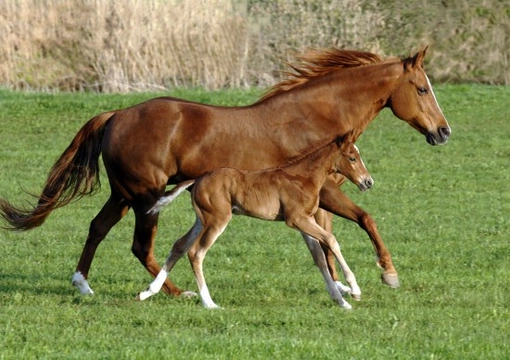
Research Shows Foals Do Learn From their Mothers
Recent studies carried out in Denmark show that foals learn all about scary things from their mothers and they do so at a very young age. Researchers noticed that when mares handled frightening situations calmly, they passed this on to their foals. The result was that foals in turn grew up to be more confident horses and were far less likely to spook or be scared by things they had already encountered when they were with their mothers.
The study involved twenty two mares and their respective foals. Over time it was noted that the mothers transferred how they reacted to things on to their foals. This "habituation" to situations and things refers to the way horses get used to handling and not reacting to things they normally find scary. When a horse gets used to things when they are young, they don’t tend to react badly to them later on in their lives and take them in their stride.
Foals Saw How their Mothers Handled Scary Things
Researchers set it up so that before the mares foaled, they were introduced and habituated to five scary things and situations. This included having an umbrella opened close to them, having a plastic bag rubbed over them and even having to walk over some tarpaulin. This habituation to scary things worked well because when the mares foaled, they were again presented with the same situations with the foals merely being observers at their mother’s side and the result was the mares did not react at all.
Other mares were not put in these situations and neither were their foals so a comparison could be made between the two groups. Foals that observed their mothers reacting well or not reacting at all, to a scary situation or object were seen to be more readily inclined to accept things than foals that had not been introduced to the same situations.
Foals that had watched their mothers being rubbed with a plastic bag did not flinch or react to the same thing being done to them. However, foals in the other group moved away from the bag every time it was put anywhere near them.
Foals Remembered Their Lessons
Both groups were then turned away to pasture for three months and no further tests were carried out on any of the mares and their foals during this period of time. At five months, the two groups were bought back in and researchers then tested the foals again in order to gauge their fear levels in the situations they had been introduced to before being turned away.
The foals still did not react to what normally would scare a horse and if they did react in any way, they were far less frightened even after five months had passed by. However, foals in the other group remained fearful of things because their mothers had not been habituated to these scary things. This proved the earlier a foal was introduced to a scary situation or object and whose mothers did not react to them, was able to remember the positive experience even over the passage of time.
As a bonus, researchers also noticed that the foals that took part in the experiment watching how their mothers reacted to things also benefited from discovering objects for themselves because they were allowed to freely move around the "habituation" sessions they witnessed with their mothers. More often than not, a foal's curiosity got the better of them which meant they wanted to explore things and left their mother's sides to do so.
Researchers Recommend Breeders to the Same
The results of the studies is very encouraging with researchers recommending that breeders use the same or similar methods of habituating their breeding mares to scary things and frightening situations so that when they have their foals at foot, they too can see how their mothers react and follow suit.
Conclusion
One of the things that most riders and people who work around horses are all too aware of, is the fact that certain situations and objects frighten their mounts. This can often lead to an accident happening or a horse injuring themselves as they take flight. Horse are after all "flight" animals. However, the research recently carried out in Denmark shows that foals can learn from their mothers and if the mares don't get scared, then foals tend not to be frightened either. The good news is that this early education stays with foals so that when they are mature horses, they are habituated to things that horses normally find scary and try to run away from.



